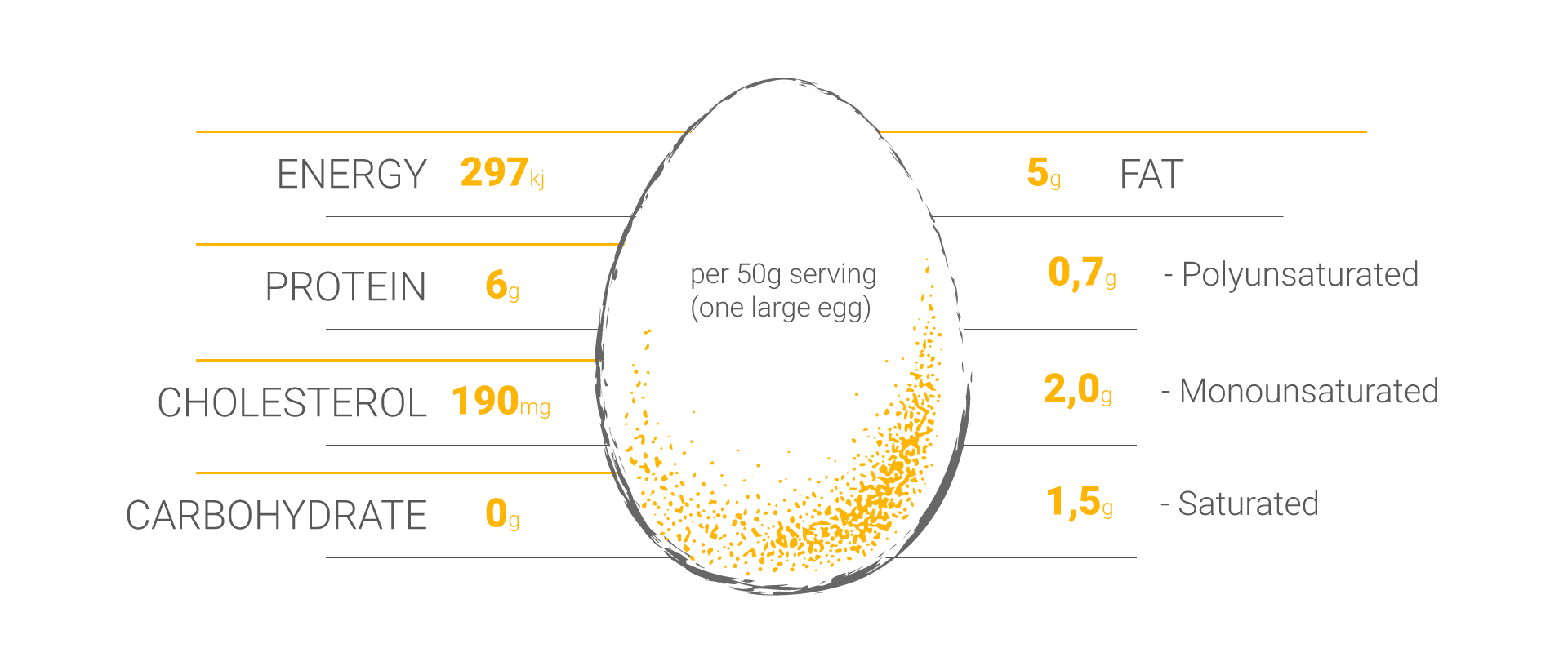
Eggs are one of nature’s most nutritional foods. One large egg contains about 70 calories and a variety of nutrients, vitamins and minerals.
Eggs provide a source of high-quality protein. Protein is essential for building and repairing body tissue. Your muscles, hair, nails, organs, skin, as well as antibodies, enzymes and hormones, are all made up from protein. The protein contains 20 amino acids, 9 of these your body cannot make naturally and must get from food. Eggs are one of the few foods that are considered to be a complete protein as they contain all nine essential amino acids.
Below is a table further detailing the nutritional value of eggs.



There is a misconception that the consumption of eggs should be limited due to their high cholesterol content (high blood cholesterol being one of the risk factors of coronary heart disease). Extensive research has however proved that dietary cholesterol, as consumed in eggs, has very little effect on blood cholesterol. The fats found in eggs contain heart healthy monounsaturated and polyunsaturated fats. Together with the nutritious B vitamins (folate & vitamin B12), all eggs contain omega-3 and omega-6 fatty acids.
Omega-3 fatty acids are essential in maintaining a healthy heart. They also lower blood pressure, reduce blood clots and blocked vessels and prevent hardening of the arteries.
Nutrient | Benefit | Percentage of Recommended Daily intake: |
|---|---|---|
Vitamin A | Carries oxygen to the blood. The iron found in eggs is easily absorbed by the body | 8% |
Vitamin E | A good disease-preventing antioxidant | 6% |
Vitamin D | Strengthens bones and teeth. This vitamin helps protect against certain cancers and auto-immune disease | 2% |
Folate | Helps produce and maintain new cells | 15% |
Vitamin B12 | Helps prevent heart disease | 30% |
Thiamin | Helps prevent complications in the nervous system, brain, muscles, heart, stomach, and intestines | 2% |
Niacin | May help lower cholesterol, ease arthritis and boost brain function | 6% |
Riboflavin | Helps the body break down carbohydrates, proteins and fats to produce energy | 15% |
Iron | Carries oxygen to the blood. The iron found in eggs is easily absorbed by the body | 2% |
Zinc | Helps with immune system function and metabolism | 5% |
Phosphorus | Helps keep bones strong and healthy | 6% |
Protein | Essential for building and repairing body tissues | |
Selenium | Works in conjunction with Vitamin E to prevent the breakdown | |
Lutein and zeaxanthin | Maintains good vision | |
Choline | Plays a strong role in brain development and function |
Eggs are also an excellent source for Choline. Choline, which is found in eggs and dark leafy vegetables, has been shown to play a strong role in the development of brain function and memory. One egg will provide you with half the amount of Choline that you require daily. Experts suggest pregnant or lactating woman eat eggs to ensure adequate Choline intake.
Eggs have no trans fat and are low in saturated fat. Saturated and trans fats found in foods like pastries, packaged food and processed snacks can raise the level of ‘bad’ (LDL) cholesterol in your blood and increase the risk of heart disease.
EGGS – ONE OF NATURE’S MOST NUTRITIOUS FOODS!!!
